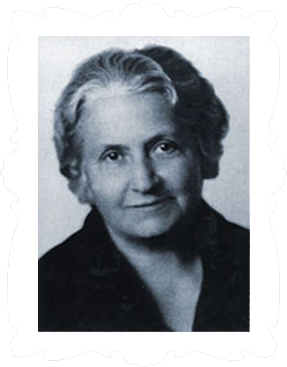Maria Montessori
 Maria Montessori (1870-1952) was the very first woman in Italy to graduate from medical school (1894) and becoming the female doctor. She was educator, philosopher and three-time Nobel Peace Prize nominee.
Maria Montessori (1870-1952) was the very first woman in Italy to graduate from medical school (1894) and becoming the female doctor. She was educator, philosopher and three-time Nobel Peace Prize nominee.
After being appointed director of the Orthophrenic School in 1898, Maria Montessori taught special needs children who were called " uneducable" or "unhappy little ones". Her first notable success was to have several 8 years old students apply to take the State examinations for reading and writing. The "defective "children not only passed, but had above-average scores, an achievement described as "the first Montessori miracle."
Montessori observed that every child has a spontaneous urge to learn and effortless ability to absorb knowledge from their surroundings without memorizing or taking notes. The children were using their environment as the educational tool. She evolved a new method that revolutionized teaching concepts, freeing the child from the rigid disciplines of conventional education.
She believed that if her method worked for disabled children, then it could be used to benefit all children in a powerful way. Maria Montessori opened her first day care, Casa dei Bambini (Children's House), in Rome and began perfecting her method. Maria Montessori introduced a very successful miniature life community for children known as the prepared environment, where the children were invited to explore and choose their own work for as long as they wanted.
Her ideas and understanding of the child psyche began to spread to other parts of the world. The first Montessori school in the United States was established in Tarrytown N.Y. in 1912. Montessori schools were growing rapidly in Europe. Montessori was exiled by Mussolini because she refused to compromise her principles and make the children into soldiers. She lived in Spain and Netherlands until 1939.
In 1939 at the age of 69, Maria was invited to India and had to live there until 1949 for the duration of war. Maria established Indian Montessori Training Courses which laid a strong foundation for the Montessori Movement in India. It was here that she developed the practical foundation of peace education, and developed many ideas taught in teacher training course today. By her devotion for lasting peace through education, Maria was nominated three times for the Nobel Peace Prize.
Maria Montessori passed away in the Netherlands in 1952 after a lifetime devoted to the study of child development.
What Makes a Montessori Education Unique?
Prepared Environment
The Montessori classroom is an inviting and hands-on learning environment. The materials are carefully designed to invite the child to explore. All furniture and learning objects are fitted to child size, and the classroom is beautiful with brightness and color. In this small world, there is a sense of peace and calm with soft voices and quiet feet.
The Teacher's Role
The Montessori teacher's role differs from that of a traditional teacher. While she sets ambitious classroom objectives, she understands that every child is wonderfully unique. She keenly observes learning style, interests, and needs, tailoring lessons to each child and keeping a detailed record of their progress. Trained to recognize periods of readiness, she presents materials at the appropriate time in their developmental stages. Sometimes she must divert a child who chooses material beyond his ability; at other times she must encourage a child who is hesitant.
Mixed Age Group
The classroom is a little community of children 2 ½ to 6 years old, where children of all ages interact with one another. The younger ones have a graded series of role models, and the older ones develop self-confidence and leadership by helping the younger ones.
Non-Competitive Atmosphere
Each child works individually with the materials, proceeding at their own pace in a non-competitive setting. His progress is not compared to the achievements of other children, but only related to his previous work. Montessori believed that competition in education should be introduced at a later stage, once the child has gained confidence in basic skills.
Accommodation of Different Abilities
The Montessori teaching format accommodates every level of ability and learning pace. After all, children mature at very different rates. Faster children can progress to higher levels without waiting for slower classmates, who have to work longer on the same activity. Some youngsters begin to read and calculate at an unusually early age. The students of high level of ability are constantly challenged by the wide variety of materials. This way, learning occurs naturally and joyfully at the proper moment for each child.
